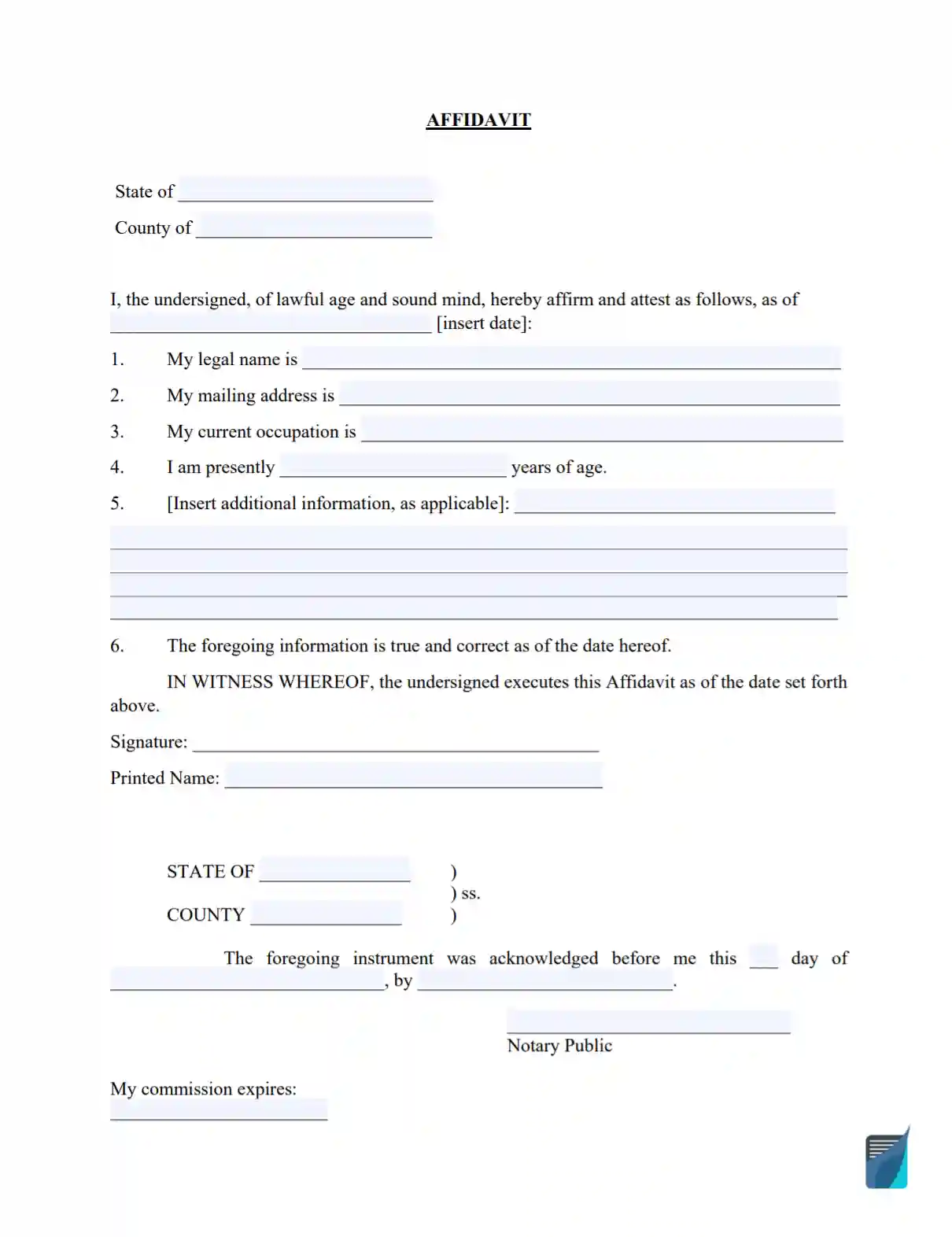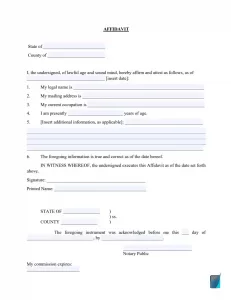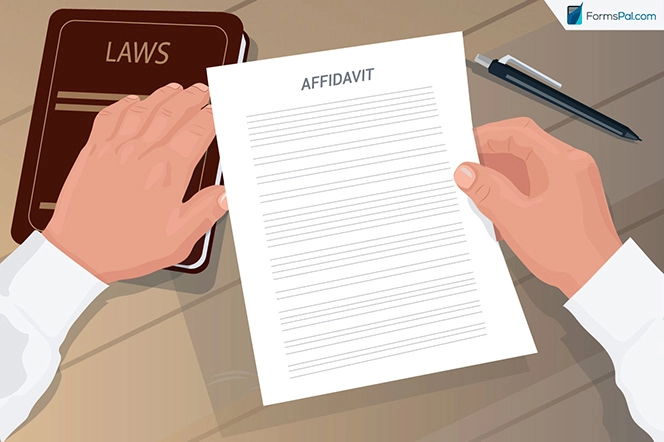Affidavit Forms
An affidavit is a document that is used to make a written statement that is confirmed by oath or affirmation by a notary or another authorized person.
The main purpose of such a document is to let a person making a statement claim that it is true and confirm that they understand that they will be legally punished in case the statement is partly or entirely false. The punishment can be different and is generally picked by the court.
If validated properly, the document has the same effect as testification under oath. It is most commonly used to obtain testimony from a witness who cannot physically appear for the court hearing.
An individual making a statement is referred to as the deponent or affiant.
An affidavit form is considered completed when the deponent signs and notarizes the document.

Build Your Document
Answer a few simple questions to make your document in minutes
Save and Print
Save progress and finish on any device, download and print anytime
Sign and Use
Your valid, lawyer-approved document is ready
Affidavit Forms by State
Types of Affidavits
There are many different types of affidavits depending on the type of statement an affiant makes. For example, a financial affidavit is used to reveal an individual’s financial situation in cases of divorce. One should use an affidavit of residency when aiming at attesting the truthfulness of an individual’s place of living and is usually made under oath. A small estate affidavit is a tool for beneficiaries to inherit real estate without going through a probate process.
There is also a specific type of affidavit called a self-proving affidavit. It is used by a testator when creating a will in case they want to help beneficiaries avoid being challenged after the testator’s death. Most states require this document to be witnessed by two adults and notarized.
Another specific type of affidavit is a counter-affidavit. It is used in situations where a court case is brought in a small claims court by a plaintiff in order to sue another party for money owed and a defendant thinks that the plaintiff is the one who is in default for owing money. Such an affidavit usually requires paying a certain court fee.
You can read about most affidavit types in more detail below and on their respective pages.
Affidavit of Affixture – an affidavit of affixture is a document that asserts that an individual who has a mobile home in their ownership affixed it to the land. In this way, they eliminate the possibility of mobile home relocation and become eligible for getting an FHA loan.
Affidavit of Birth – in an affidavit of birth, an individual swears that a person they know was born. The document helps prove an individual’s citizenship or get a new birth certificate. It includes specific information about the birth and parents. Those who have direct knowledge of a person’s birth can create this affidavit.
Affidavit of Correction – an affidavit of correction is meant to help an individual fix inaccurate information in any legal form filed with a legal entity or governmental body. Most commonly it helps fix motor vehicle registration or title paperwork, real estate deeds or liens, birth and death certificates, etc.
Affidavit of Death – in an affidavit of death, a person swears that an individual they know died. It might be required when one needs to notify a bank or insurance company about the person’s death, when you want to remove the deceased name from a property deed you owned jointly, etc.
Affidavit of Domicile – an affidavit of domicile is used to identify the legal residence of a person who passed away. The document is typically needed to facilitate the probate process when a decedent leaves behind securities to transfer, such as stocks and bonds.
Affidavit of Friends – an affidavit of friends is a valuable form for those who entered an international marriage and want additional proof of bona fide marriage for USCIS officers. The affidavit is typically created by relatives, friends, or neighbors of the couple.
Affidavit of Heirship – an affidavit of heirship acts as proof of identity of the heirs of a person who has died without a will (intestate). The document helps beneficiaries avoid lengthy and costly probate proceedings.
Affidavit of Identity – an affidavit of identity serves as a tool to confirm the identity of an individual making a sworn statement. The document helps eliminate the risk of facing fraud or identity theft.
Affidavit of Indigency – an affidavit of indigency is a document that is used by an individual who claims that they are unable to pay court costs. In case the court approves the request to waive the court costs, the affiant is freed from paying the specified court costs and fees.
Affidavit of Non-Paternity – an affidavit of non-paternity is a legal document where a man swears under oath that he is not the biological father of a child. This document is commonly used in paternity disputes to establish that the man is not legally responsible for any financial or legal obligations related to the child.
Affidavit of Residency – an affidavit of residency is a sworn statement about a person living at a certain address. It helps prove residency of a certain state for local DMV, the residence of a child in a parent’s home, and in many other situations.
Affidavit of Service – an affidavit of service is used when an individual serves a document to another person or entity. The document is created by the delivering party and helps prove that the document was served to the recipient. It is very helpful in court proceedings.
Affidavit of Single Status – an affidavit of single status will help you confirm the absence of current marriage and the ability to enter into official marriage if you are a US citizen who plans to get married in another country. The document might require notary acknowledgment and getting an apostille.
Affidavit of Parental Rights Relinquishment – an affidavit of voluntary relinquishment of parental rights is a legal document that is used by a parent who wishes to give up their parental rights to their child.
Contractor’s Affidavit – a contractor’s affidavit is a legal document that attests to the payment in full made by a contractor, subcontractor, or supplier for their work or materials provided on a construction project.
Financial Affidavit (Form CJA-23) – a financial affidavit is a form that might be requested by a court in order to get some financial information from the affiant. The form includes information about checkbook outtakes, recent bills, personal account statements, and paystubs.
Gift Affidavit – a gift affidavit is a document used to record the fact of giving a gift to a person. Typically, it is created when a motor vehicle, art object, or other valuable things are given as a gift. The document verifies that the person making a gift doesn’t expect anything in return.
Reasonable Cause Affidavit by Payor – Form P-1, or Reasonable Cause Affidavit by Payor, is a document used by payors to request a waiver of penalties for not providing a payee’s Social Security Number (SSN) or Taxpayer Identification Number (TIN) on tax-related documents.
Scrivener’s Affidavit – a scrivener’s affidavit is used when parties to a legal document want to bring some minor changes to it. It is used when parties have done typographical errors, misspellings of a name, etc.
Vehicle Ownership Affidavit – a motor vehicle ownership affidavit is a legal document used to establish ownership of a motor vehicle when the title is unavailable or incomplete.
Affidavits vs. Sworn statements
Despite the fact that those two types of documents ate very similar, a sworn statement is a separate type of court documents. Unlike affidavits, sworn statements are not acknowledged by a public official meaning they might be less acceptable as a form of evidence in courts.
But there is a big advantage to using sworn statements – the absence of the need to certify them saves a lot of time for parties in a trial, especially considering the fact that sworn statements are treated in a very similar manner to affidavits by courts.
When Might You Need an Affidavit?
It would make sense to use an affidavit in cases of:
- making statements that are about to be filed with the court
- verifying residency or identity of an individual
- claiming property
- confirming the change of the name due to the change of marital status
- confirming not possessing stolen property or illegal drugs
- verifying death
- confirming the ability to provide financial support etc.
Requirements for an Affidavit
First and foremost, an affidavit needs the affiant’s signature. It is important to not put their signature before they appear at the notary office.
Most of the cases require affidavits to be notarized. Along with a notary public, the powers of validating the document are also given to a clerk, attorney, or court judge. Who needs to sign an affidavit depends on the type of document and the state where it was issued.
After the document is notarized, it should be filed with the local court clerk’s office. A filing fee might be needed to process the affidavit.
However, in some cases, the affiant can go without notary acknowledgment. Then an affidavit is called a sworn affidavit. Only the affiant should sign an affidavit in such a case, and the document should include a provision stating that the information written in the affidavit is punishable by perjury if found not true. The penalty of perjury might include monetary fines, community service, and even jail time which will depend on the state. But a sworn affidavit is not the safest option as it is a notary acknowledgment that adds extra validity to the document.

How to Write an Affidavit in 4 Simple Steps?
Choose the affidavit type you need

Among a big variety of affidavit types, choose the one that fits your legal needs. Note that some affidavits require using a state-specific form. For example, to create an affidavit of support, Form I-864 should be used. Or, if you need an affidavit of identity theft, the Internal Revenue Service website will be of help with Form 14039.
To make sure there are no issues regarding an affidavit form you are about to use, call or visit the website of your local court to learn whether they provide affidavit templates online. Affidavit forms might be free but sometimes you would need to pay a small fee to use them.
Then, decide whether you want to write the document on your own or use an affidavit template found on the net or provided on our website. For instance, a general affidavit such as an affidavit of residence doesn’t require using a state-issued template meaning you can benefit from our free affidavit form.
Write down the facts

Speaking of witnessing affidavits, it is important for a witness writing an affidavit to include only events that happened in real life and that they saw, said, or heard. It is possible to include information that isn’t first-hand knowledge, but in such a case, an affidavit requires clear wording that this information is not first-hand.
Facts in an affidavit should be written using clear language. Vague statements that are hard to recall should be avoided from including in an affidavit. Opinionated descriptions of events are also frowned upon.
Please note that once the testimony is validated, it is impossible to change it.
Check the document with an attorney

The first category of affidavits that needs the help of a lawyer is an affidavit with the testimony of a witness. It is important to seek legal help as a legal professional can help make any necessary edits or changes so the information is 100% accurate.
However, if an affidavit is made to verify the identity of a beneficiary or their residency, the deponent might go without an attorney’s help.
Validate the affidavit

When an affidavit has been crafted properly and reviewed by a legal advisor, a notary public should witness the moment of signing an affidavit. However, the notary’s task here is to only certify the validity of the signature, not the truthfulness of the statements included in the affidavit. A notary-acknowledged affidavit will have a notary’s printed name and signature.
How to Fill out an Affidavit?
Based on the fact that affidavits are used for different purposes, you should seek a specific affidavit form for your legal needs. But speaking of a general affidavit that could be used for any topic, it will include the following information.
Step 1
In the header of an affidavit, write the date of creating the document, the name of the attorney if one is involved, the name of the affiant, and the name of a notary public who is witnessing the affidavit.

Step 2
In the main body, there should be specific wording about the affiant being capacitated to give sworn testimony in written form. Generally, it implies that an affiant is of legal age and of sound mind.
Then, the statements that are sworn to be true should be written down.

Step 3
In a signature section of the document, the date of notary acknowledgment and the name of the notary public should be included which should be followed by the signatures of the affiant and the notary.
If you need a proper affidavit template, use a free affidavit form provided on our website.
